|
|
|
Sort Order |
|
|
|
Items / Page
|
|
|
|
|
|
|
| Srl | Item |
| 1 |
ID:
166381
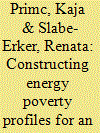

|
|
|
|
|
| Summary/Abstract |
Energy poverty is becoming ever more important for academia and policymakers. This study conducts fuzzy-set qualitative comparative analysis (fsQCA) with the aim of constructing energy poverty profiles. FsQCA was performed on 150 households. The results show that energy-poor households are characterised by the interdependence and intertwining of socio-demographic (ownership status, education level, labour force status and household size) and housing (type of building, central heating system and solar collectors/heat pump) characteristics. The conditions form eight equifinal configurations related to energy-poor households. None of the individual characteristics is able to explain energy poverty alone, although strong interrelations are present in the outcomes. The study also highlights that the conditions play different roles in the presence or absence of energy poverty, giving policymakers the necessary leeway to formulate effective policies as part of agendas covering poverty in general, poor health, climate change and domestic energy inefficiency. This study suggests that energy poverty is a structural issue, mainly arising from poor energy-efficient buildings and/or labour market inefficiencies.
|
|
|
|
|
|
|
|
|
|
|
|
|
|
|
|
| 2 |
ID:
159582
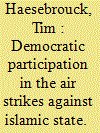

|
|
|
|
|
| Summary/Abstract |
Although over sixty partners have joined the US-led coalition against the Islamic State (IS), only a handful of states was willing to carry out air strikes against IS-targets. This article aims to explain the pattern of democratic participation in the air campaign. It builds on the rich literature on military burden sharing and democratic peace theory to develop a multi-causal model, which is tested with Qualitative Comparative Analysis. The results of the analysis suggest that the pattern of participation in the air strikes results from a complex interplay between alliance politics, threat perception and domestic institutional constraints. The threat posed by foreign fighters and a strong interest in a good relationship with the US constituted important incentives to participate in the air strikes, while a high level of parliamentary involvement in military deployment decisions inhibited participation. Furthermore, states that were situated in Russia's immediate vicinity refrained from participating, in spite of their strong dependence on the US' security guarantee. Lastly, the analysis did not provide convincing evidence that partisan politics had an impact on participation in the air strikes.
|
|
|
|
|
|
|
|
|
|
|
|
|
|
|
|
| 3 |
ID:
168439
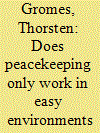

|
|
|
|
|
| Summary/Abstract |
Peacekeeping is widely considered to be an effective means of preventing civil war recurrence. However, as peace has collapsed in a considerable number of cases despite peacekeeping efforts, we are left with the question which combinations of peacekeeping environments and peacekeeping missions lead to lasting peace. This article compares 22 peacekeeping missions between 1990 and 2012. While prominent United Nations documents assume that the success of post-conflict peacekeeping primarily depends on the features of the mission itself, the analysis shows that characteristics of the terminated civil war have a strong influence on whether peace endures. Restrained peacekeeping, defined by low troop density, non-robustness, and a lead nation that is not a permanent member of the Security Council, only succeeds in preserving peace in conducive environments. Inconclusive war endings, evenly distributed military capabilities at war’s end, ethnic conflicts, and high intensity create a particularly difficult context for peacekeeping.
|
|
|
|
|
|
|
|
|
|
|
|
|
|
|
|
| 4 |
ID:
147309
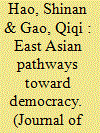

|
|
|
|
|
| Summary/Abstract |
What drove the East Asian tide of democratization during the “Third Wave?” Instead of focusing on a single-factor explanation, we perform qualitative comparative analysis (QCA) on fourteen cases in the region of East Asia from 1980 to 2000 and find three parallel pathways: (1) overthrow model, which features the positive effects of mass mobilization against authoritarianism under a deinstitutionalized authoritarian regime; (2) urban pressure model that works under an institutionalized authoritarian regime; and (3) inside-out model, in which democratization is triggered by the joint forces of domestic and international conditions under both types of regimes. These results demonstrate that the authoritarian status quo ante is an important determinant of democratic transitions.
|
|
|
|
|
|
|
|
|
|
|
|
|
|
|
|
| 5 |
ID:
191847
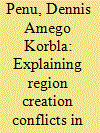

|
|
|
|
|
| Summary/Abstract |
For the first time in its history, Ghana held a referendum in 2018 to divide some of its regions to create new ones. Though the regions are purely administrative, the division faced resistance in some areas and not in others. This study combines qualitative comparative analysis with process tracing to show that the resistance occurred within regions with relatively high support for the opposition party, but only in the combined presence of (traditional) elites competing from either side of the region and controversies regarding claims to (traditional) political authority. Further, it finds a bottom-up mechanism of the resistance, evolving as the threatened interests of stakeholders grew from the community to the regional, national and diaspora levels. As in other African cases, this suggests that the sources of conflicts in Africa are not so much about ethnic differences but more about elites’ unequal access to political and economic resources.
|
|
|
|
|
|
|
|
|
|
|
|
|
|
|
|
| 6 |
ID:
147899
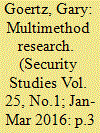

|
|
|
|
|
| Summary/Abstract |
This article conceptualizes multimethod research as doing cross-case causal inference—statistical analyses, experiments, or Qualitative Comparative Analysis (QCA)—together with within-case causal inference in the form of case studies. In addition, game theoretic multimethod work is explored as combining a game theoretic model with case studies. The role of case studies is to explore causal mechanisms which cannot be captured in the cross-case, for example, statistical analyses. The article then describes the logic of case selection for case studies in order to explore causal mechanisms. Various combinations of X and Y variables are analyzed, some of which are useful for causal mechanism analysis and others which are not. Finally, the Avoid Overdetermination Rule is presented, which deals with issues of confounders, control variables, and alternative explanations.
|
|
|
|
|
|
|
|
|
|
|
|
|
|
|
|
|
|
|
|
|